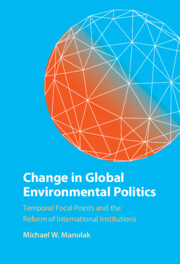 Change in Global Environmental Politics
Change in Global Environmental Politics Published online by Cambridge University Press: 12 May 2022
This chapter focuses on the 1992 United Nations Conference on Environment and Development (UNCED), the Rio “Earth Summit.” It shows how, despite incentives to address institutional dysfunction and mounting global environmental problems by institutionalizing sustainable development within the United Nations system, divergent expectations persisted until momentum built toward UNCED. The Rio conference, which marked the twentieth anniversary of the 1972 Stockholm conference, emerged as a Temporal Focal Point in United Nations environmental politics. Convergent expectations triggered a significant increase in political and analytical investments in change processes from state and non-state actors, leading to a transformation of the informational and political context. These investments produced significant institutional change, including the creation of the Commission on Sustainable Development (CSD) and the institutionalization of the World Bank-operated Global Environment Facility. States also launched the United Nations Framework Convention on Climate Change, the Convention on Biological Diversity, a set of Forest Principles, and the United Nations Convention to Combat Desertification.
To save this book to your Kindle, first ensure no-reply@cambridge.org is added to your Approved Personal Document E-mail List under your Personal Document Settings on the Manage Your Content and Devices page of your Amazon account. Then enter the ‘name’ part of your Kindle email address below. Find out more about saving to your Kindle.
Note you can select to save to either the @free.kindle.com or @kindle.com variations. ‘@free.kindle.com’ emails are free but can only be saved to your device when it is connected to wi-fi. ‘@kindle.com’ emails can be delivered even when you are not connected to wi-fi, but note that service fees apply.
Find out more about the Kindle Personal Document Service.
To save content items to your account, please confirm that you agree to abide by our usage policies. If this is the first time you use this feature, you will be asked to authorise Cambridge Core to connect with your account. Find out more about saving content to Dropbox.
To save content items to your account, please confirm that you agree to abide by our usage policies. If this is the first time you use this feature, you will be asked to authorise Cambridge Core to connect with your account. Find out more about saving content to Google Drive.